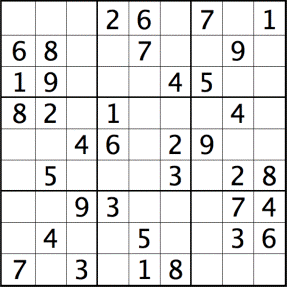This program serves as my Python solution for the Problem: Sudoku board Validator on Codewars. I found the problem quite intriguing, so I have it as a basic project in this repository!
Rules of Sudoku1
Sample Sudoku Game Board
The Sudoku board consists of a square grid of 9 x 9.
In this project we represent the board by 9 lists (each consisting of 9 elements) nested as individual elements in a single list.
3 checks are needed to be made on the board:
- Each list (or row) must contain the digits 1-9 without repetition.
- Each column must contain the digits 1-9 without repetition. (i.e. each list's element of the same index must not have repeating digits, yet should have all digits from 1-9)
- Each of the nine 3 x 3 sub-boxes of the grid must contain the digits 1-9 without repetition.
It creates a set of integers (1-9) which are valid as a solution for any column, row, or sub-box. Then, it first makes the checks for the 1st rule.
valid = {1,2,3,4,5,6,7,8,9}
for row in board:
if set(row) != valid:
return FalseIf the rule is satisfied, then it makes checks for the 2nd rule.
for i in range(9):
for j in range(9):
col.add(board[j][i])
if col != valid:
return False
col.clear()If the rule is satisfied, then it makes the last checks for the 3rd rule.
i, j, k = 0, 1, 2
start = 0
square = set()
for rects in range(3):
for col in range(2, 9, 3):
square.update(set(board[i][start:col+1]))
square.update(set(board[j][start:col+1]))
square.update(set(board[k][start:col+1]))
if square != valid:
return False
start += 3
square.clear()
i+=3
j+=3
k+=3
start = 0
return TrueIf all these checks are passed, it means it is a valid Sudoku solution, and it returns True.
Check the sample test-cases in the code for a better understanding.
